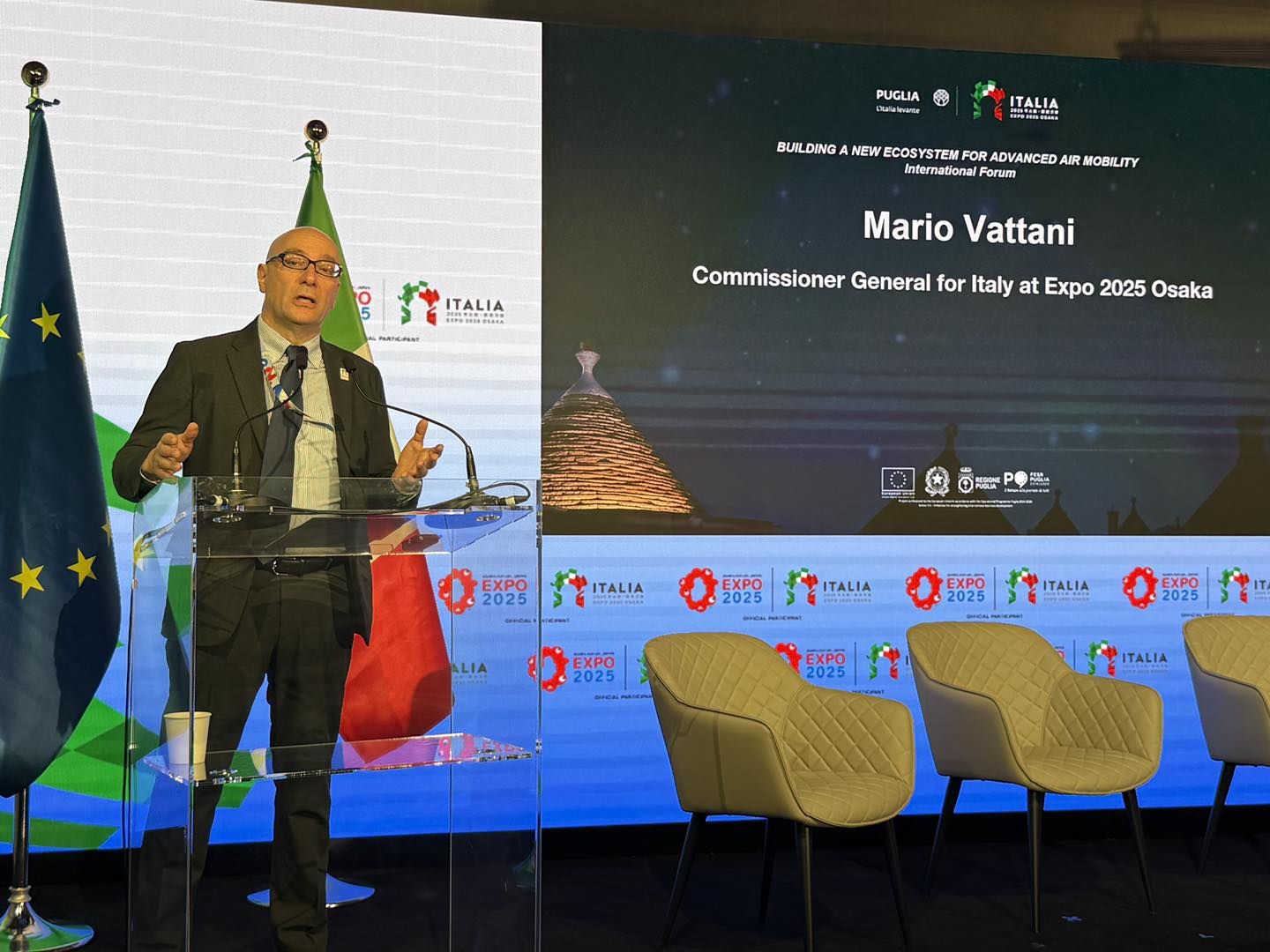Aerospace industry as key to sustainable mobility. The Puglia Region's International Forum at Expo 2025 Osaka closes Puglia's regional week at Expo.
Date:
16/05/2025

Aerospace industry as key to sustainable mobility. The Puglia Region's International Forum at Expo 2025 Osaka closes Puglia's regional week at Expo.
The aerospace and aviation industry remains a key player in the transition to a sustainable future, thanks to innovative solutions aimed at reducing the environmental impact of mobility and regional development. This crucial role is supported by the development of advanced air mobility systems. This was discussed this morning during the international forum "Building a New Ecosystem for Advanced Air Mobility," promoted by the Puglia Region, in collaboration with Puglia Sviluppo, and the Aerospace Technology District (DTA) within the Italian Pavilion at Expo 2025 Osaka.
"The challenge launched with today's forum," said Francesca Zampano, Director of the Puglia Region's Section for the Promotion of Trade, Crafts, and Internationalization of Businesses. The Puglia Region, in collaboration with the Aerospace Technology District, is ready to contribute to the construction of an ecosystem for Advanced Air Mobility. The forum represents an important step towards the creation of an integrated and international system for Advanced Air Mobility, based on cooperation, innovation, and knowledge sharing."
The meeting provided an opportunity to outline a roadmap for the future of Advanced Air Mobility (AAM), comparing growth strategies between Europe and Japan and highlighting successful initiatives in the infrastructure, aircraft, and services sectors.
This commitment, as Giuseppe Acierno, President and CEO of DTA, emphasized, represents a virtuous cycle destined to radically transform the way we travel: "It's only a matter of time," he said, "and this is inevitable. This is why it is essential to leverage Puglia's capabilities, its systems, and its infrastructure to ensure our region's technological leadership in the sector."
The GATB (Grottaglie Airport Test Bed) infrastructure, an airport and aerospace research and testing center funded by the Puglia Region at Grottaglie's "Marcello Arlotta" airport, is a prime example of this vision. Home to the Airport Test Bed, the first national spaceport and integrated logistics hub for cargo transport, the airport is poised to become the first European hub for the development of unmanned aircraft, which will make intelligent specialization its hallmark. Grottaglie Airport develops, tests, experiments, and trials intelligent transportation systems, utilizing technologies from research centers, universities, public departments and agencies, and the private sector. The Airport Test Bed tests unmanned aircraft, opening up a new market and potentially generating economic growth for countless applications ranging from agriculture to communications, digital mapping to wildlife management, satellite augmentation systems, and air quality monitoring. The national industry lacked a dedicated infrastructure for the research, testing, and development of unmanned aircraft: having one in Puglia is a significant competitive advantage.
"We," Acierno concluded, "believe that not only Grottaglie, but the entire Puglia region, can become a strategic infrastructure. A system that, in two years, will be even more significant because there is a regional government that believes in it and is convinced that this is one of the greatest challenges for the future of the region."
The forum, opened with institutional greetings from Ambassador Mario Vattani, Commissioner General for Italy at Expo 2025, was moderated by Munish Khurana, Senior Manager of ATM/UTM Business Development at Eurocontrol, who emphasized how "advanced air mobility can help us achieve the goal of sustainability." Illustrating the "Drone Strategy 2.0 for a Smart and Sustainable Unmanned Aircraft Eco-System in Europe," Khurana emphasized that "this strategy promotes technological and industrial development to create a free market for drone services."
The success of an AAM ecosystem, however, also depends on coordination between European and national bodies. In this context, the role of Eurocontrol, together with authorities such as ENAC (Italian Civil Aviation Authority) and JCAB (Japan Civil Aviation Bureau), is strategic.
On this point, Kotaro Yamamoto of the Japan Civil Aviation Authority emphasized that the civil authority "is committed to coordinating and developing specific regulations to ensure the safety of operations with new aircraft types and to managing collaboration between the public and private sectors to foster the responsible growth of this new sector."
Alberto Iovino of D-Flight/ENAV added that "in Europe, the European regulatory framework for U-space, based on the use of air mobility and the needs of people, It is coherent and comprehensive, but we are aware that it must evolve to progress further." Iovino also added that "Puglia is a technological district with which we often work in symbiosis to develop innovative mobility, which represents the future of air mobility."
In the photo: Ambassador Mario Vattani, General Commissioner for Italy at Expo 2025.

